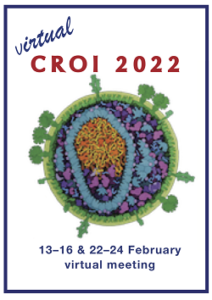CROI 2022: Biktarvy (B/F/TAF): 5-year follow-up in two phase 3 studies
1 March 2022. Related: Conference reports, Antiretrovirals, CROI 29 (Retrovirus) 2022.
Kirk Taylor, HIV i-Base
 Single tablet regimen B/F/TAF (bictegravir/emtricitabine/TAF) is one of the leading first line combinations in US guidelines.
Single tablet regimen B/F/TAF (bictegravir/emtricitabine/TAF) is one of the leading first line combinations in US guidelines.
CROI 2022 included a poster reporting combined 5-year follow-up in two phase 3 studies in treatment naïve individuals that either excluded HBV positive (GS-US-380-1489) or included those with HBV and/or HCV (GS-US-380-1490).
Participants from studies 1489 and 1490 (n=506) continued onto a 96-week open label extension to evaluate on-treatment 5-year safety and efficacy. [1]
There were 62 discontinuations from the combined studies up to week 240 (11% and 13%, respectively). These were reported as due to: participant decision (22), loss to follow up (28), death (1), protocol violation (1), side effects (4), investigator decision (3), low adherence (2) and lack of efficacy (1).
Participants were recruited form multiple centres (USA, UK, Europe, Canada, Australia, Dominican Republic and Puerto Rico) with median age 31 (range: 18 to 71), the proportion of women was low at 9% (1489) and 13% (1490), 33% were Black or African-American, whilst 24% were Hispanic/Latinx. Median body weight was 77 kg (IQR: 68 to 88 kg) and HIV-1 viral load was matched at entry.
Over 97% of participants achieved the primary endpoint of undetectable viral load (<50 copies/mL) by week 48.
Median CD4 counts increased by 313 cells/mm3 (IQR: 179 to 475) and 331 cells/mm3 (IQR: 215 to 467) for participants on 1489 and 1490, respectively. Criteria for resistance testing were met for nine people but neither NRTI nor INSTI resistance were detected.
Low-grade adverse events were commonly reported and included diarrhoea (19% and 24%), headache (16% and 21%) and nasopharyngitis (18% and 19%), all in 1489 and 1490 respectively. Less than 1% of participants (n=5) withdrew from the study due to grade 3-4 adverse events linked to B/F/TAF.
Renal function testing demonstrated an initial decline of eGFR, consistent with previous reports with bictegravir (due to inhibition of tubular secretion of creatinine). No adverse renal events were reported.
Fasting lipid levels were modestly increased over five years with no change in TC:HDL.
Minimal details were included for weight changes although median cummulative weight gain was +6.1 kg. Increases after the first year were reported as comparable to the general population (0.3 to 1.5 kg/year).
Spine and hip bone mineral densities did not decrease beyond 2% across the study period, with a mean decrease of 0.29% at week 240.
The study concluded that these data provide important long-term safety and efficacy data for B/F/TAF.
References
- Wohl et al. B/F/TAF Five-year outcomes in treatment-naive adults. CROI 2022. 12-16 February 2022, virtual. Poster abstract 494.
https://www.croiconference.org/abstract/b-f-taf-five-year-outcomes-in-treatment-naive-adults - Pharmacokinetics and full phase 2 results for bictegravir, a new integrase inhibitor. (HTB 27 February 2017).
https://i-base.info/htb/31239
This report was first published on 14 February 2022.

